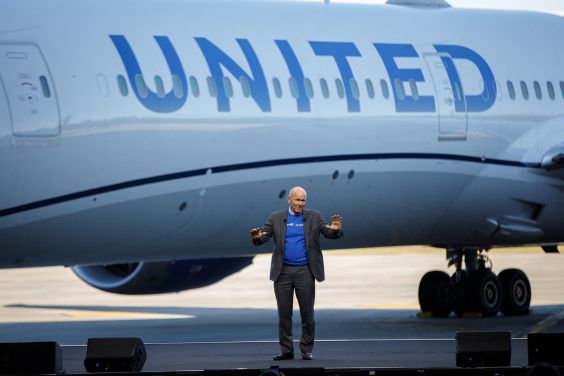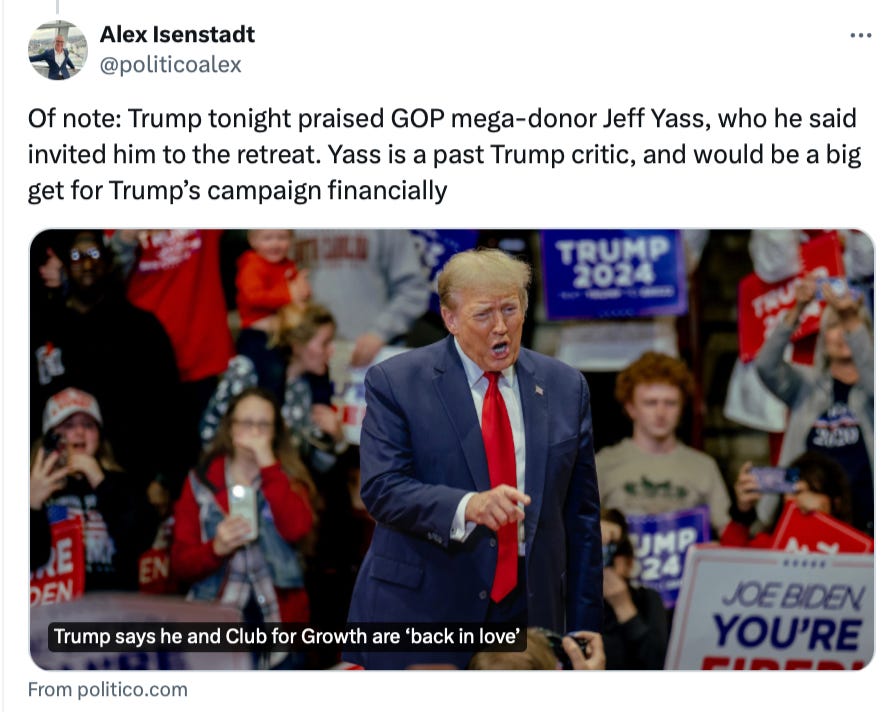
Back on February 6, Donald Trump posted on Truth Social that, in his opinion, Bud Light had learned its lesson from the backlash to their Dylan Mulvaney marketing deal and so it was okay for conservatives to drink their beer again. Why the flip-flop? Well, it turned out that “a top Republican lobbyist for the company is set to host a fundraiser for the former president next month, with some tickets going at $10,000 each.”
That episode was a reminder of many things. One, is that while Trump is often portrayed in the press as some kind of atavistic force of nature, he is in fact perfectly capable of exercising restraint and strategic discipline when he wants to. The other is that unlike a conventional politician, he almost never exercises restraint and strategic discipline to advance a substantive public policy goal. Instead, he operates on a basis of self-interest. And at times, as during the Bud Light fight, the kind of tawdry corruption that results from this can seem appealingly moderate and practical compared to the ideological fanaticism and self-righteousness that so often dominates American politics.
Then, there is TikTok.
In the waning day of Trump’s presidency, he fired off executive orders that purported to bar TikTok from the US versions of the Apple and Google app stores on the grounds that it was controlled by the People’s Republic of China government. This was characterized in some quarters as an order “banning TikTok,” but the practical upshot was to try to get it sold to an American company. Then Joe Biden won the election and withdrew the order on the grounds that it was unlikely to hold up in court. But Biden also continued a Commerce Department investigation into the company, and TikTok reached a deal whereby user data would be stored on servers in Texas rather than in China. This didn’t fully resolve the issue — the anti-TikTok movement retained some support in congress, I wrote about how Trump had this right and data privacy was not the real issue, and the Biden White House seemed torn between their concern about TikTok’s relationship with the Chinese government and their worry that, on a political level, they didn’t want to be seen as shutting TikTok down.
This week, though, the House Energy and Commerce Committee advanced a properly drafted bipartisan bill that attracted unanimous support in committee and that the White House says they will sign. The authors, this time, have been very careful to say that their intention is not to ban TikTok but to force its sale to a company that isn’t subject to CCP control. And while it’s a long road from Energy and Commerce to enactment, the support really is incredibly broad.
Except now Trump suddenly loves TikTok:
You can get an extremely credulous account of why Trump changed his mind about this from Axios, or you can hear the truth: He did it for money.
For years, Billionaire Jeff Yass has been a major donor to conservative causes and Republican politicians. He’s also a major investor in TikTok, which means he could lose a lot of money if TikTok gets shut down. But more to the point, he also stands to lose a lot of money any time the authoritarian Chinese government wants to make him lose money. He’s under their thumb and has been spending freely on pro-TikTok advocacy and leaning hard on lawmakers. Right before Trump’s flip-flop on TikTok, he had a big sit-down with Yass and the Yass-backed Club for Growth, and got some kind of financial commitment from both parties. Then, he started publicly praising Yass.
That’s the dark side of Trump’s “transactional” approach to politics. You can buy him off on basically any topic. You can do it with campaign contributions, but you can also do it opaquely through his empire of clubs and golf courses and real estate holdings. Or you can do it through his family ties. There are many ways to bribe Trump, and that means that even when you’re inclined to say he got something right — as I was inclined to say about his stance on TikTok — you can’t expect him to hold to it.
The problem with TikTok is propaganda
My sense of the argument around TikTok is that the debate has been bedeviled by overstatements from TikTok’s critics, which have in turn been met by TikTok defenders setting an excessively high evidentiary bar.
Here’s the analogy I like to use. It’s 1975 and a state-owned Soviet firm wants to buy CBS. What happens? Well, what happens is they wouldn’t be allowed to. The FCC would block it. The Committee on Foreign Investment in the US or its predecessors would block it. If they didn’t have the power, congress would write a new law. And even if it wasn’t CBS, if it was a chain of local TV affiliate stations, the outcome would be the same. There would be no detailed factual analysis or demand for gold standard evidence that a Soviet-owned television statement might do Moscow’s bidding or that television is capable of influencing public opinion. We’d reject the idea out of hand. And rightly so, because the downsides would be very clear, and the upside minimal.
That’s how the TikTok situation looks to me.
Let’s say a law passes saying TikTok will be banned from the United States unless ByteDance sells it. Most likely, it ends up getting sold to a big American tech company. Somewhat less likely, the CCP decides to teach the world a lesson by killing TikTok. In that case, people who currently love TikTok will migrate to the copycat short form video products from Meta and YouTube, and the world will go on. Yass and his allies have done a lot to promote the idea that this is a critical electoral issue for Zoomers, but there is no evidence of that in any surveys. It’s true that lots of Zoomers love TikTok (if it weren’t popular, there would be no issue), but it’s not like they’re all going to be sobbing over the lack of short form video apps.
And that’s really all there is to it.
Is TikTok, in fact, “poisoning the minds” of a generation of children, as Katie Britt said in her State of the Union response? If it is, it’s probably not a deliberate Chinese plot. There’s a lot of evidence that heavy use of social media is bad for mental health, and particularly disruptive to school age kids. That’s not Xi Jinping’s fault, and it wouldn’t be fixed via sale to an American owner. But sporadically leaked evidence out of China suggests that TikTok does, in fact, engage in censorship on topics the Chinese government deems sensitive.
How much censorship? Nobody knows. Because the nature of this sort of app is that you can’t tell what kind of thumb is on the algorithmic scales. When I searched TikTok for content related to Uyghurs, three out of the four top videos I got were revisionist accounts about how the West has this all wrong and Uyghurs are treated well in China. One of the four, though, was conventional human rights content. On the one hand, that is definitely less censorship than you would see on a Chinese social media network. On the other hand, it does seem like the app is promoting Chinese propaganda.
But we don’t need to wait for open and shut evidence that the platform is being censored or used to deliberately promote propaganda. We should just have a very strong presumption that it will be used in the way and act accordingly. After all, we don’t know what skirmishes with Taiwan or India or Vietnam lie in the future or what topics the PRC may want to throw its weight around on. We want to try to maintain the economic benefits of ongoing commerce with China while minimizing the risks to the American information environment. And TikTok fails that cost-benefit analysis.
China presents a big speech dilemma
I think something the people asking for more evidence overlook is the Chinese government’s long track record of throwing its weight around in the information space.
The best example came in 2018, when Mercedes Benz, a German car company, posted in English on Instagram quoting the Dalai Lama. Even though Instagram is blocked in China, this somehow sparked spontaneous grassroots backlash on the Chinese internet and caused Mercedes to officially apologize. The post in question, to be clear, didn’t even quote the Dalai Lama on a sensitive aspect of Tibetan nationalism. It said “look at the situations from all angles, and you will become more open.”
But of course, for every clumsy and embarrassing move like that, there are a dozen more subtle examples of Chinese influence. In Marvel comics, the Dr Strange stories feature a Tibetan supporting character, The Ancient One. This character was portrayed in the Marvel Cinematic Universe by Tilda Swinton, perhaps to appease Chinese authorities but who can say for sure? Either way, Doctor Strange did play in China and shareholder value was maximized. But the Doctor Strange sequel ended up banned because an incidental shot of a newspaper kiosk showed the Epoch Times, a right-wing anti-PRC paper that circulates in the diaspora.
Apple has reportedly warned creatives working on Apple TV+ projects against any negative depictions of China. Here, the concern, I think, is less that they want Apple TV+ content to air in China than it is that Apple’s main business as a smartphone company has a lot of investment in the Chinese market and, like Mercedes, they don’t want to jeopardize it.
The point is that we know Chinese censorship is both aggressive and opaque, often proceeding through informal pressure rather than explicit rules. It’s also something that we largely hear about only through occasional leaks. Tim Cook doesn’t talk on investor calls about every TV show idea that Eddy Cue or his subordinates crush because they’re worried about Chinese backlash. Why doesn’t China seem to play any role in the geopolitics of “For All Mankind?” Maybe the writers got a note, maybe they didn’t need to get a note. Either way, I wouldn’t expect anyone involved to tell us the truth if asked.
Don’t trust the CCP, don’t trust Trump
Cases like Apple and Mercedes pose what I think are genuinely tough questions for policymakers. The hope of the old Clinton/Bush economic integration with China push was that growing economic ties would export western information norms into China. It’s clear that, in practice, the reverse happened, and commerce ties allow China to export censorship and propaganda, while retaining control over its domestic information environment.
This raises a wide range of thorny issues, but “should we let a Chinese company own a major American content network?” seems like it’s all the way at one end of the spectrum. The fact that many of TikTok’s downsides may have nothing to do with Chinese control only underscores that the costs of congressional action on this topic are extremely low. The commercial pursuit of increasingly addictive short form video apps is just not an important social priority that we need to worry about. I am a little bit concerned about the magnitude of power in the hands of Facebook and Google, which is why we should make a good faith effort to get TikTok sold rather than shut down. But the question of social media concentration is really one that needs its own policy solutions (I like Paul Romer’s idea of a progressive tax on digital ad revenue) and shouldn’t be decisive here.
Because this is an election year, though, I also once again want to implore center and center-right people to take a good hard look at the reality that the Orange Man is, in fact, bad.
I think many in those camps respond to the often-hysterical tone of anti-Trump commentary by bending over backwards to give him more credit than he deserves. I often hear that Trump was “right” about China, and I definitely think it’s true that the old approach to China was wrong. But there was a broad consensus shift starting in Obama’s second term, which is why the Trans Pacific Partnership was designed specifically as an anti-Chinese containment vehicle. Trump’s main thing, as an individual, was making absolutely no distinction between strategic competition with China and generalized hostility to trade — often targeting American allies in ways that undermined his ostensible diplomatic goals. He spent the whole winter of 2019-2020 praising Xi’s Covid policy and assuring everyone that there was nothing to worry about, because he was trying to seal the deal on a big sale of soybeans.
Regardless, I do think it is correct that the old pro-engagement consensus deserved to die, which is why there has been a mostly continuous evolution of American policy over the past decade toward containment.
The thing about Trump, though, is that he’s a totally corrupt and unprincipled person.
He’ll say his signature issue is border security, and then spike a border security bill because he thinks that will help him win. Or he’ll say his signature issue is getting tough on China, and then go soft on China in exchange for financial support from an American billionaire with business dealings in China. Well, guess what? There are a lot of rich guys around the world with business dealings in China. Think about that Mercedes ad. Think about Apple’s approach to content. Think about the NBA’s embarrassing attitude toward Hong Kong. The whole point of having a democracy is that the United States makes policy decisions based on ideas about the public interest, not the financial welfare of individual rich guys. Trump is just built different. He’s transparently for sale, and foreign authoritarian regimes know it.

Paul Wall asks about my Casablanca comment:
The post My view of *Casablanca* (with spoilers, but you’ve seen it already?) appeared first on Marginal REVOLUTION.



When Rick won’t give Laszlo the letters of transit, and Laszlo asks him why, Rick says “I suggest your ask your wife.” In essence he is forcing Laszlo to force Ilsa to confess to their earlier Paris affair in as humiliating a way as possible. Ilsa has to tell not only of the affair, but that she promised Rick eternal fealty, and treated Rick so badly that he now would be so vindictive.
When Ilsa visits Rick in his room that one night toward the end of the movie, he “takes” her again, and gets her to fall in love with him again, or so it seems. But is Ilsa only acting, and playing to Rick’s vanity to get the letters of transit? You can debate that point, but either way Rick seems happy enough to sleep with her on that basis. That is one of his ways of humiliating her again, and it enables him to be psychologically free enough to let her go in the movie’s final scene.
[Interjection: I view her recurring attachment to Rick as real, and her love for Laszlo as somewhat daughterly, and that she is self-deceiving throughout with both men. That said, what she most loves about Rick is that she can partake in the relationship without having to be known, without having to be anybody at all. She and Rick, as a couple in ordinary life running errands at the Five and Dime in Cleveland, probably would not do so well. Ilsa is a woman who never has found herself and is somehow always in transition, always on the run. It is no surprise she attaches to two men with broadly similar tendencies.]
At the movie’s end, Rick gives Ilsa back and insists she leave Casablanca with Laszlo. What a hell their marriage is going to be. Stuck in America, where neither has much to do, though he lives for his work. Laszlo now knows she loved Rick more, knows she just fell for Rick again and slept with him the night before (women willing to prostitute themselves is a recurring theme in the film), and knows she has been lying to him in various ways throughout their relationship. Ilsa knows these things too, and now knows that Laszlo knows. But what really is Laszlo’s choice or Ilsa’s choice other than to proceed? They end up playing the roles of puppets in Rick’s little planned charade.
Rick gets to wander off with Louis (“this is the beginning of a beautiful friendship”), into the Free French garrisons in the desert, facing struggles but also enjoying a true freedom, including a freedom from Ilsa because he humiliated and punished her so much, and because that punishment will be so enduring. He had been waiting around in Casablanca to punish her, and now he really cannot punish her any more. Life can go on.
If you recall the scene where Rick helps the young husband win at the roulette table, so his wife doesn’t have to prostitute herself to get exit visas, we know that the more sentimental side of Rick regards such prostitution as an ultimate humiliation, not as a mere transaction to be digested in Benthamite fashion and then forgotten.
A more Benthamite Rick might have been a happier and better-adjusted guy.